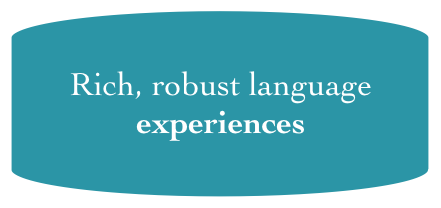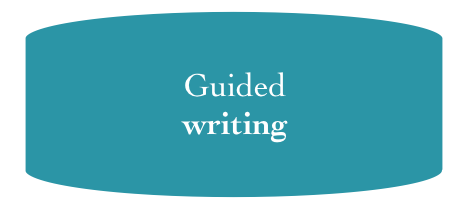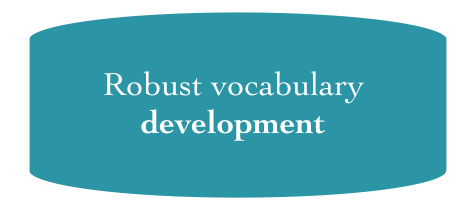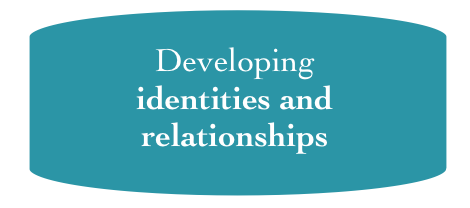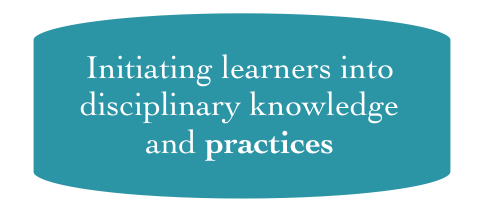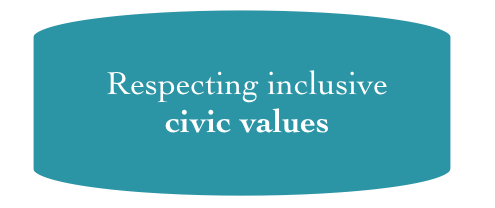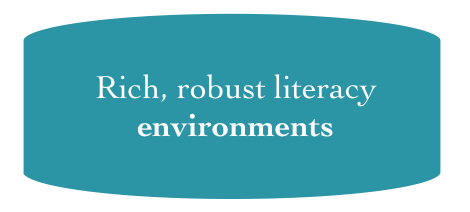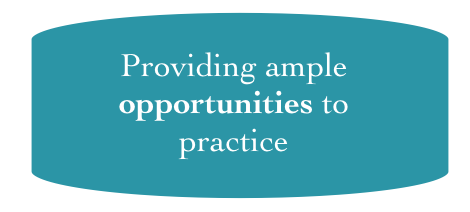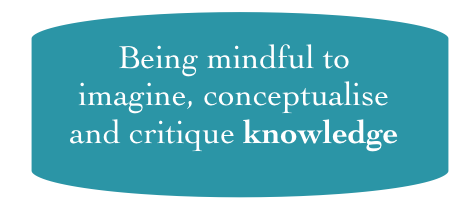Commanding a Clear View:
Encouraging Comprehensive, Equitable & Resourceful Teaching
“I shall teach him to use the words by means of examples and by practice. — And when I do this I do not communicate less to him than I know myself. In the course of this teaching ... I do it, he does it after me; and I influence him by expressions of agreement, rejection, expectation, encouragement. I let him go his way, or hold him back; and so on. Imagine witnessing such teaching. The expressions “and so on”, “and so on ad infinitum” are also explained in this teaching. A gesture, among other things, might serve this purpose.”
If one were to isolate one principle which has a strong bearing on learning, I would broadly place that emphasis on the notion of becoming-ness, for want of a better term. We become speakers of language. We become readers and writers. We become parties in conversations. We become participants and practitioners. We become knowers and connectors. We become members of communities. We "become" in particular ways granted that we have access to certain conditions and opportunities. We become part of something, and we come to see aspects - including language and literacy - in certain meaningful ways through the assistance offered by other people, by culture, by communities, etc.. The child (or emerging learner) is not faced with the prospect of developing such complex skills from the get go. There is a progressive, temporal dimension to this learning where the child is supported by others to develop foundational skills which lead into competency which lead to mastery which lead to further disciplinary practice.
The Principles Folder is a special section on the site. In it, visitors will find practical guidance that applies to teaching and learning, whether this is occurring in urban, rural or remote contexts. This section gets to the rough ground and engages with everyday educational matters such as providing rich, meaningful language learning; engaging in deep conceptual development; initiating learners into disciplinary practices; fostering attitudes and identities; and inspiring vivid, imaginative and critical comprehension. We are interested in the language and literacy practices that people become part of and the knowledge that we are brought into.
Before I proceed with the introduction, it is important that I - at least - mention what the Planning Folder contains. This folder refers to thematic discussions that engage in the subtleties of teaching and learning. It discusses the developmental nature of literacy and it calls for balanced, comprehensive instruction. There will be advice on how to plan and assess and on how to establish effective teaching and learning practices. Over time, there will also be example lesson plans and case studies (coming soon) which celebrate examples of rich, multifaceted language, literacy and learning development. Visitors may also be interested in background notes, essays readings lists and glossaries.
However, without further ado, let us discuss some principles applicable to language and literacy learning ...
“When a child learns language, it learns at the same time what is to be investigated and what not.”
Firstly, the literate individual has benefited from enabling relationships as well as access to adequate spaces, time, resources and formative experiences that aid and reinforce what it means to be literate. It is indispensable to acknowledge that literate practices are refined in collaboration with others (having people to talk to, to read with and to write to).
On one hand, becoming a literate individual involves a control of a notation that needs to be mastered. It takes time and regular practice to master / control this code. This control involves the dimensions of phonology, orthography, semantics, syntax, morphology and pragmatics. This attention to the structural facets of language & literacy is an important first step in examining how language (e.g. the propositional sentences) is able to convey (any) meaning.
It is true to note how novice users must endure early stages where it is a challenge to gain mastery of manipulating the structural and formal elements of the linguistic symbolism before being able to speak and listen and read and write fluently and with confidence. The individual regularly encounters new forms, content and contexts where his or her literacy and knowledge will be challenged and extended. The teacher's role (including parents) is to offer explicit, systematic scaffolding and practice which gradually extends the learner's skills and understandings.
On the other hand, language and literacy - in particular - are not merely systems to be commanded. They include a range of expressive tools used amongst ourselves in context to describe, record, discover, speculate, share and explore. A user's repertoire of language practices - or language-games - can be correlated to the user's participation in the collective intentional activities in communities of practice, which include both verbal and non-verbal activities. From this perspective, it is important to see language and literacy as they occur, are learned and are used within the great hurly burly of life.
“There are differences in upbringing, in schooling, in access to higher learning, and more generally in the social environment in which one leads one’s life. And these differences result in the mastery of different vocabularies and rhetorical devices; in different pronunciations, dictions, and writing styles; and in different discursive competences. It is important to note that language is not used in an abstract space of logical relations but in a social space that is structured by power relations.”
It goes without saying that the experienced language/literacy user takes many items for granted. It is helpful to forget that it was once quite a challenge to read and hear that code; to shape letters with delicacy; to retrieve a word from memory and understand its spelling; to form a sentence; to make sense of sentences whether they appear in poetry or in a textbook; to write in a manner fitting the occasion and the audience; and to allow oneself the time to read-interpret-and-learn.
It is also easy to forget the degree of background knowledge and experience that one relies upon to comprehend (become immersed in) a text. ”If you understand anything in language, you must understand what the dialogue is, and you must see how understanding grows as the dialogue grows.” (Rhees, 2006, p. 7) Here "understanding" requires that one knows of, is a part of and cares about the discussion, whether it is "the rights and wrongs of capital punishment; the chances of success of a particular business venture - and so on." (pg. 7). In particular, "you might know the technique - you might know how to use the expressions but would not understand it (or them) unless you could know how it was connected with the [discussion]." (pg. 6 - 7). This combination of skills and contextual understandings become broad stabilising factors that make any communication possible.
“As Wittgenstein insists in a number of places, the use of expressions in our language depends on the existence of broad stabilities and continuities that we take for granted — and it is important that we do take them for granted. Without the stabilities and continuities in ourselves and in the world, certain language-games would, in fact, not arise.”
Therefore, it is important to recognise that there is a cognitive or psychological dimension of mastering the code, developing schemas and deliberating over the reading and writing process. Yet there is also the cultural or social dimension as one masters a repertoire of texts, practices, beliefs and knowledge that make up one's cultural and social participation. If we refer to Stanley Cavell’s terminology, we can see the human form of life as existing across two planes: “a vertical (or biological) [plane] – whereby the human form of life is distinguished from other forms of life (higher and lower); and a horizontal (or ethnological) [plane], which accounts for socio-cultural differences within a form of life.”
There are certain skills that are essential to having the capacity to access literacy. This involves developing confidence with the fundamentals, exploring new words, preparing and accepting knowledge, and establishing methods and practices. But it also involves one appreciating and incorporating the role of "textuality" into one's life, such as writing lists, emails, letters, notes, poems, etc. And it is bolstered when one experiences positive encounters of meaning making (and learning) through talk and texts with others (e.g. sharing a favourite book with someone you respect).
“Without an affective investment and commitment, our words become unintelligible and empty; with that commitment words begin to show other manners of signification beyond the realm of literal meaning and correspondence.”
Language, literacy and learning require the development of ways of seeing, ways of working and ways of relating to others. They require the development of competencies, methodologies, appreciations and relationships. They require an appreciation of others in the literate community when composing a message, so that a message is conveyed in a way that will "hit that target squarely and rightly", because rarely is a message received as intended by the expresser.
What - then - is all this kerfuffle about language and literacy? What do robust language and literacy skills enable? I can sum up the importance of language and literacy in three words: independence, control, and participation. A person who speaks on his or her own behalf and who is a skilled reader and writer can independently advocate for him- or herself and navigate his or her own learning. And since literacy is a constructive skill (as Wittgenstein's picture theory suggests), the individual learns new ways to control and critically reflect on experience. And the development of language and literacy skills amongst a community of practice allows one to participate in that group, to contribute to that group and to find a valued identity therein.
Language, literacy and knowledge allow one to shape the world around one and they allow for one's perception of the world to be shaped by others. Literacy allows one to access information; construct and organise knowledge; participate in a community of practitioners; adopt the many ways of being readers and writers; and persuade (and be persuaded), inform (and be informed), entertain (and be entertained) … ponder, explore, speculate upon, confirm and represent experience.
“The pupil must want to go on alone in taking language to the world, and that what is said must be worth saying, have a point (warning, informing, amusing, promising, questioning, chastising, counting, insisting, beseeching, specifying the location of pain, and so on) ... If it is part of teaching to undertake to validate these measures of interest, then it would be quite as if teaching must, as it were, undertake to show a reason for speaking at all.”
The discussion suggests - perhaps asserts - that children’s minds do not simply develop naturally because they get older. They develop because of the assistance offered by more experienced peers or adults. Jeanne Chall reminds us that "[therefore] literacy can be seen as dependent on instruction, with the corollary that quality of instruction is key. This view emphasizes the developmental nature of literacy — the passage of children through successive stages of literacy, in each of which the reading and writing tasks change qualitatively and the role of the instructor has to change accordingly.” (Chall, 1996 as referenced in Snow, 2004). In context, one must acknowledge that “literacy [is only] one facet of a rich nuanced language environment that embraces a vast spectrum of multimodal - oral, written, visual, gestural and symbolic - forms of communication. … Studies [must address] the anthropological concerns associated with … identity formation; socialisation and learning; and cultural transmission and reproduction across the generations reflective of context, culture and history." (Kral, 2012, pg. 2)
“I cannot describe how (in general) to employ rules, except by teaching you, training you to employ rules.”
This approach to language, literacy and learning recognises that learning is impacted by the formative experience of one's engagement with the world and others, which combines aspects of interpersonal, intrapersonal and cultural development. The language, literacy and learning practices that individuals interpret and engage in are part of not only their language development, but also their social development. The pages on this website provide teaching advice, strategies, assessments and examples that meander between cognitive and social, structural and contextual, individual and cultural perspectives on learning. Achievements of language, literacy and learning are both individual and communal achievements. I welcome you to this section, and I look forward to developing this section over the coming weeks, months and years.
Please explore the many sections of this site: the journal, the glossaries, the ever-expanding readings, the essays and background notes and - most importantly - the discussion pertaining to the teaching of language and literacy, the adoption of learning practices, and the active construction of knowledge. If you have a comment, a suggestion or a question, then please do not hesitate to send us a message.
References
Cavell, S. (2005). Philosophy the day after tomorrow. In Philosophy the day after tomorrow (pp. 111 – 131). Cambridge, MA: Belknap Press.
Chall, J. S. (1996). Stages of reading development (2nd ed.). Fort Worth: Harcourt Brace Jovanovic College Publishers.
Fogelin, R. (2009). Taking Wittgenstein at his word: a textual study. Princeton: Princeton University Press.
Kral, I. (2012). Talk, text and technology: literacy and social practice in a remote Indigenous community. Bristol, UK: Multilingual Matters.
Krebs, V. (2010). The bodily root: seeing aspects and inner experience. In W. Day & V. Krebs (Eds.), Seeing Wittgenstein anew (pp. 120 – 139). Cambridge: Cambridge University Press.
Medina, J. (2008). Whose Meanings?: Resignifying Voices and Their Social Locations. The Journal of Speculative Philosophy, 22(2), 92–105. doi:10.1353/jsp.0.0030
Rhees, R. (2006). Wittgenstein and the possibility of discourse (2nd ed.). Oxford, UK: Blackwell Publishing.
Snow, C. (2004). What counts as literacy in early childhood? In K. McCartney & D. Phillips (Eds.), Handbook of early child development. Oxford, UK: Blackwell Publishers.
Wittgenstein, L. (1967). Zettel. (G. E. M. Anscombe & G. H. von Wright, Eds.). Berkeley, CA: University of California Press.
Wittgenstein, L. (1969). On Certainty. (G. E. M. Anscombe & G. H. von Wright, Eds.). New York: Harper Torchbooks.
Wittgenstein, L. (2001a). Philosophical Investigations (3rd ed.). Oxford, UK: Blackwell Publishing.
Wittgenstein, L. (2001b). Tractatus logico-philosophicus. London: Routledge.


